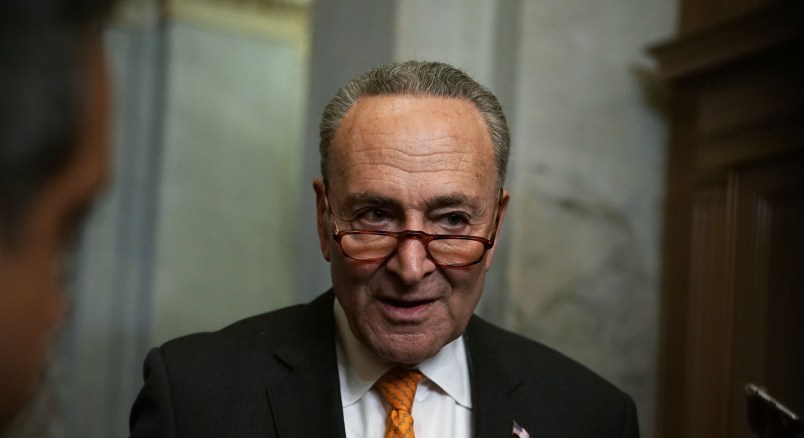Democratic Senate leaders previewed their plans Tuesday to force votes on changing the impeachment trial rules proposed by Majority Leader Mitch McConnell (R-KY) that would fast track proceedings and make it even harder than previously expected to secure witness testimony or document subpoenas.
Minority Leader Chuck Schumer (D-NY) would not say exactly how many amendments Democrats planned to put up for votes ahead of expected final approval of McConnell’s resolution Tuesday evening. Schumer said the Senate would vote Tuesday on “witnesses, documents, egregious rollbacks from even the Clinton [impeachment] rules.”
So far, no Senate Republican has expressed public discomfort with McConnell’s resolution, despite the fact that it significantly departed from the rules employed for the Clinton impeachment trial, a model that McConnell previously claimed he would follow.
While Democrats likely lack the votes to force through their amendments, they will seek to put GOP senators on the record opposing an open, transparent and substantive impeachment trial.
Asked about a statement issued by Sen. Mitt Romney (R-UT) — who has previously called for witnesses testimony— supporting McConnell’s resolution, Schumer said that he hoped that Romney had “carefully read the McConnell resolution.”
“He’s always said he thinks there should be witnesses at the end of the trial. This makes it harder to even get those,” Schumer said.
Specifically, the McConnell resolution requires a Senate vote before the parties in the impeachment trial can even put forward motions to subpoena witnesses. If witnesses are subpoenaed, they must first be deposed in private, under McConnell’s resolution, before an additional Senate vote on whether public testimony is in order from them.
McConnell’s proposal also requires a Senate vote before the evidence gathered in the House impeachment inquiry is even admitted into the Senate record.
“McConnell seems to want a trial with no existing evidence and no new evidence,” Schumer said. “A trial with no evidence is not a trial at all. It’s a cover-up.”
Schumer said the push for several amendment votes on the trial resolution was not about being “dilatory.” He also declined to weigh in on the political impact the impeachment process would have on Republicans, such Sen. Susan Collins (R-ME), who have tough re-election races this year.
“We are doing this because we think we have a constitutional duty,” Schumer said. “We think that this is what the Founding Fathers looked at when they said how do we deal with a President who has abused his power.”
The acrimonious debate expected to surround Tuesday’s resolution sets this impeachment procedure apart from the Clinton impeachment, where agreement opening phases of the trial was reach unanimously by the Senate.
“Right off the bat, Republican senators will face a choice about getting the facts or joining Leader McConnell and President Trump in trying to cover them up,” Schumer said.



